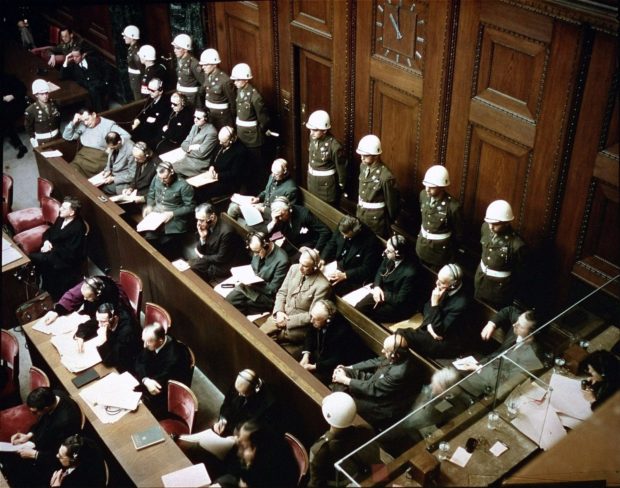(Originally posted January 26, 2021; revision 10/1/2022)
On October 1, 1946, the verdicts in the first round of Nuremberg (“Nürnberg”) Trials were handed down.
As the Russian invasion and illegal “annexation” of Ukraine continue and the question of war crimes is in the air, it is instructive to look back at the most famous war crimes in history, the Nuremberg Trials of Nazis in the aftermath of the defeat of Nazi Germany. The U.S. delegation was led by Robert H. Jackson
For over a month, during the summer of 1945, representatives of the Soviet, French, U.S. and U.K. governments attempted to reconcile their conflicting legal concepts and devise a workable procedure for the trial. At the core of these intense negotiations was Robert H. Jackson. Jackson refused to back down on certain legal principles, most importantly, the position that aggressive warfare was an international crime.
‘Our view, is that this isn’t merely a case of showing that these Nazi Hitlerite people failed to be gentlemen in war; it is a matter of their having designed an illegal attack on the international peace.’ ”
The Nuremberg Trials — A Don’t Know Much About® Audiominute
On November 20, 1945, in the aftermath of World War II, the first trials of Nazi war criminals began. This military tribunal, the Nuremberg Trials, as they came to be known, was convened by the four victorious Allies—Great Britain, France, the Soviet Union, and the United States.
Listen to this audiominute.

Defendants in the Dock at the Nuremberg Trials (Image: National Archives)
“That four great nations, flushed with victory and stung with injury stay the hand of vengeance and voluntarily submit their captive enemies to the judgment of the law is one of the most significant tributes that Power has ever paid to Reason.
What makes this inquest significant is that these prisoners represent sinister influences that will lurk in the world long after their bodies have returned to dust. We will show them to be living symbols of racial hatreds, of terrorism and violence, and of the arrogance and cruelty of power.”
-United States Prosecutor Robert Jackson, Opening Statement (11/21/1945)
Read Robert Jackson’s full opening statement here
On November 29, 1945, Day 8 of the Nuremberg Trials, a documentary film of the liberated concentration camps taken by American military photographers was shown. (Graphic images).
This is a timeline of the Nuremberg Trials from the Robert H. Jackson Center.
On the morning of Oct. 1, 1946, the Tribunal read the Judgment on the guilt or innocence of the individual defendants. 19 were found guilty on one or more counts of the Indictment. Three were acquitted: Schacht, Fritzche and von Papen.
After lunch on Oct. 1, 1946, Chief Justice Lawrence announced the sentences to the Defendants that were found guilty. Death by hanging: Goering, Ribbentrop, Keitel, Jodl, Kaltenbruner, Streicher, Rosenbeg, Frank, Frick, Sauckel, Bormann and Seyss-Inquart. Life: Hess, Raeder and Funk. Twenty Years: Speer and von Schirach. Fifteen years: von Neurath. Ten Years: Doenitz.
These resources on the Nuremberg Trials are from the Library of Congress.
This is an article about the Nuremberg Trials I wrote in 2005 for the Rutland (VT) Herald.